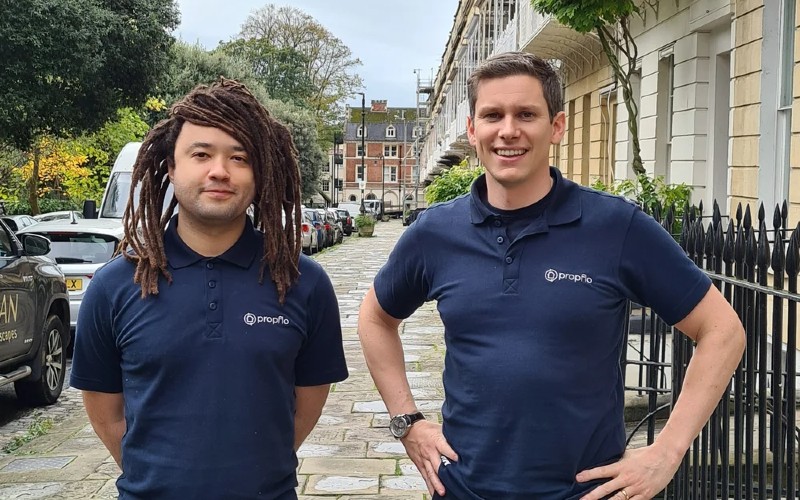Our series profiling companies from our Startups 2.0 lists continues with Luke Loveridge, co-founder and CEO of Propflo.
Propflo, which featured on Bristol Startups 2.0, supports mortgage and property businesses to nurture their customers and help them make more sustainable decisions about their property.
Its AI-powered platform analyses property portfolios to understand risks and opportunities then provides engagement tools to facilitate energy efficient retrofitting.
Loveridge (pictured right), who set up the business with Daniel Moyo (left), reflects on catching the ‘entrepreneurial bug’, calls for political stability for startup businesses following prolonged turbulence and says the South West is a great place to start a business.
Describe your personal background prior to starting the business.
I’ve always been an entrepreneur at heart and was always writing down ideas and never doing anything about them. I think this was because I wanted to be purpose-driven and not just about creating a business ‘to make money’. That first led me to work in the public sector in service change, transformation and innovation. I was lucky enough to work on the 2012 Olympics and helped secure over £30m of infrastructure and R&D projects for the City of Bristol. I also was lucky enough to secure a fellowship to the US to study city innovation between public, private and community organisations. All this gave me a great foundation.
One project I secured and managed was around how large social landlords could scale smart home devices in their properties for energy efficiency, predictive maintenance and wellbeing. This led me to launch a company called Homelink which was later acquired by a global fire alarm manufacturer. I caught the entrepreneurial bug and am now starting to scale my second business, Propflo, which provides a ‘retrofit-as-a-service’ for lenders, estate agents and mortgage brokers.
What is the biggest challenge you have faced to date? How did you overcome this, or plan to overcome this?
Continued political turbulence is the main challenge. The Truss mini-Budget forced us to pivot our business model and product to adapt to the impact of accelerated interest rates, and the government U-turn on green policies (exactly one year later!) affected demand for our product.
We were able to successfully pivot and decided to build our business to not be overly reliant on government regulation which hadn’t been signed into law yet (although it would have clearly been a major boost). We continued to grow, but I’ve seen other businesses not be so lucky and have had to do a significant pivot. The main thing business needs from government is stability.
If you were making a birthday wish for your business, what would you ask for and why?
I’d wish for government to set out a clear and ambitious package of incentives and regulation to get/help people to retrofit their homes. It’s currently piecemeal and there is no incentive for landlords to retrofit.
What benefits does being based in Bristol have for your company? How would you describe the tech scene there? What could it do better?
I grew up in an area between Bristol and Bath and have seen first-hand how great a place the South West is to start a business. It has a thriving ecosystem and support networks for founders and is well connected to London and the rest of the country.
The combined authority is also keen to support innovation. In my current business we received two innovation grants in the early stages to develop a sustainability feature which at the time was a ‘nice to have’ but is now a key part of our product.
What could it do better at? There is a tendency for some authorities and groups to fall into cliques, to be fair possibly from a combination of limited capacity and already formed trusted relationships. There could be some work to make it more open.


